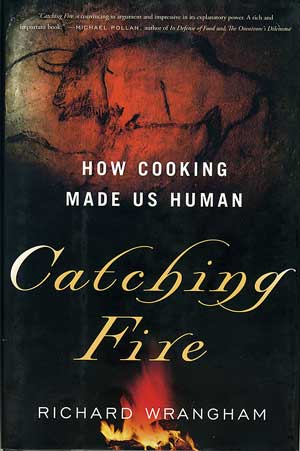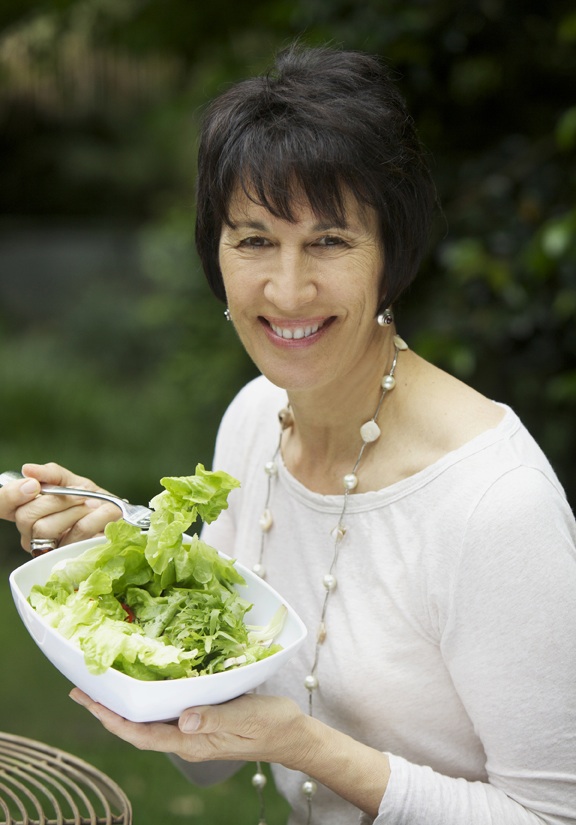Book Review: Catching Fire: How Cooking Made Us Human
Written by Catherine Saxelby
on Wednesday, 11 March 2015.
Tagged: nutrition

Eating cooked food — whether meat or plants —makes digestion easier and allows our digestive tracts or guts to grow smaller. The energy that we formerly spent on digestion was freed up, enabling our brains to grow. This book, artfully written by biological anthropologist Professor Richard Wrangham, really made me think twice about cooking and whether a Raw Diet was necessary - or even desirable. Here’s my Review.
Why cooking is good…
In this book, Wrangman makes the main point that humans have evolved to depend on cooked food, not raw or uncooked food. He believes that cooking makes foods more nutritious in 3 ways:
- It increases the proportion of the nutrients that can be digested. It does that by opening starches up so they’re accessible to enzymes, it denatures proteins, unravelling them and exposing them to the action of snipping enzymes. (Enzymes are what digest our food and allows us to absorb its nutrients.)
- It makes food easier to digest by softening it or gelatinizing the connective tissue in meat.
- It kills pathogens (harmful bacteria and viruses) which could otherwise kill us.
In contrast, a strict raw-food diet cannot guarantee an adequate supply of kilojoules/Calories, and he notes that, in one survey, 50 percent of the women on such a diet stopped menstruating.
He believes there is no way our human ancestors survived, much less reproduced, on a raw diet. He seems pleased to be able to report that raw diets make you urinate too often, and cause back and hip problems.
“Even vegetarians thrive on cooked diets. We are cooks more than carnivores.”
Downsides to cooking
Of course there are downsides to any form of cooking. For instance, heating foods at a high temperature profoundly changes them. Proteins get denatured, starches develop acrylamide, a carcinogenic compound, many vitamins get destroyed, etc. as every raw-food website quickly points out. All this needs to be weighed up against the benefits of cooking.
This book argues that contrary to the dogmas of raw enthusiasts, cooked cuisine was central to the biological and social evolution of humanity. Wrangham dates the breakthrough in human evolution to a moment 1.8 million years ago, when, he conjectures, our forebears tamed fire and began cooking.
Starting with Homo erectus these innovations drove anatomical and physiological changes that adapted us to eating cooked food the way cows are adapted to eating grass. By making food more digestible and easier to extract energy from, Wrangham reasons, cooking enabled hominids’ jaws, teeth and guts to shrink, freeing up Calories to fuel their expanding brains.
He says that the warmth provided by fire enabled us to shed our body hair, so we could run farther and hunt more without overheating. Because we stopped eating on the spot as we foraged and instead gathered around a fire, we had to learn to socialize, and our temperaments grew calmer.
Men vs women in the kitchen
Wrangham argues that cooking also gave rise to pair bonding and table manners, and liberated mankind from the drudgery of chewing (while chaining womankind to the stove), all of which is interesting and logical thinking.
“Relying on cooked food creates opportunities for cooperation, but just as important, it exposes cooks to being exploited,” he writes.
“Cooking takes time, so lone cooks cannot easily guard their wares from determined thieves such as hungry males without their own food.”
Women needed male protection.
Bottom line
This in an intellectual and thought-provoking book which I thoroughly enjoyed. Tracing the implications of our ancestors' diets, Catching Fire sheds new light on how we came to be the social, intelligent and sexual species we are today. Given the current obsession with the Paleo Diet as the ultimate diet that the human race evolved on, Catching Fire will fascinate anyone interested in our ancient origins and how they translate to modern customs. Wrangham shows that the shift from raw to cooked foods was a key factor in human evolution. Some other reviewers have found the book a bit touchy-feely and have called it “the cooking hypothesis”.
 CATCHING FIRE How Cooking Made Us Human
CATCHING FIRE How Cooking Made Us Human
By Richard Wrangham
Paperback 320 pages
Basic Books. $26.95 2010
ISBN 10: 0465020410
ISBN 13: 9780465020416
Available from the Book Depository (affiliate link) with free world-wide postage.
You may also be interested in...
Like to have your product reviewed by Catherine?
 This post was researched and written by Catherine Saxelby, an accredited nutritionist, dietitian, author and award-winning food communicator. Catherine's goal is to help busy working women eat well, maintain a healthy weight and boost their energy.
This post was researched and written by Catherine Saxelby, an accredited nutritionist, dietitian, author and award-winning food communicator. Catherine's goal is to help busy working women eat well, maintain a healthy weight and boost their energy.
Checkout Catherine’s other posts, books and product reviews or sign up for her free Foodwatch newsletter. To have your product or service reviewed by Catherine and her team, click here.
Sign up for Catherine's free Foodwatch newsletter
About the Author
Catherine Saxelby has the answers! She is an accredited nutritionist, blogger and award-winning author. Her award-winning book My Nutritionary will help you cut through the jargon. Do you know your MCTs from your LCTs? How about sterols from stanols? What’s the difference between glucose and dextrose? Or probiotics and prebiotics? What additive is number 330? How safe is acesulfame K? If you find yourself confused by food labels, grab your copy of Catherine Saxelby’s comprehensive guide My Nutritionary NOW!
The Good Stuff
The Boring Stuff
© 2023 Foodwatch Australia. All rights reserved
Author photo by Kate Williams
Website by Joomstore eCommerce








